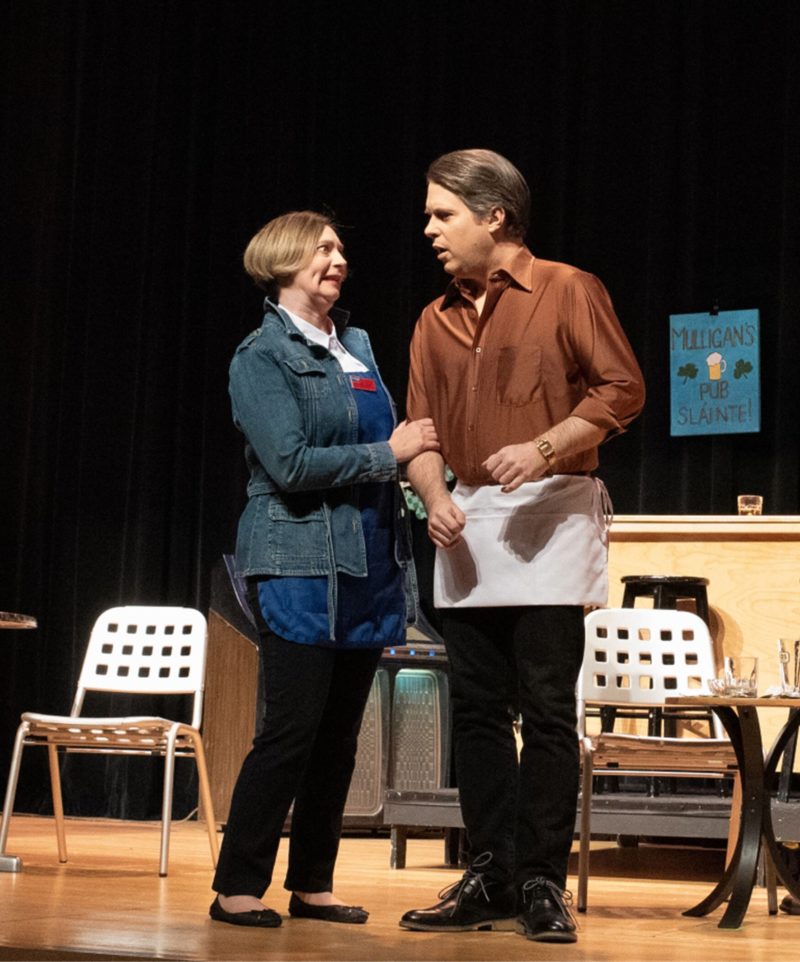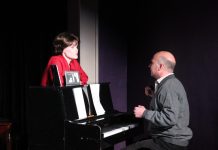Sean Grennan’s Now and Then, receiving its East Coast premiere courtesy of Upcounty Theatre in Germantown, Maryland, deals in regret anticipated and recollected, and inquires about the possibility of second chances to avoid regret. Grennan’s script repeatedly states serious, well-meant themes – follow your dreams, don’t let your life drift away busily doing things that don’t really matter – that break no new ground.

The setup involves an Irish bar in the Midwest during the 1980s, presided over by 30ish bartender Jamie (Corey Estoll), an aspiring jazz pianist, who despite his music school education is plagued by a weak right hand. Just before closing time, in walks a character called “The Man” (Bruce Rosenberg), a man in his 60s who just wants to talk for a while, but who has an uncanny familiarity with Jamie.
Jamie’s girlfriend Abby (Kelly Peters), a late-shift IHOP waitress who aspired to be a teacher but dropped out of college, joins the two. The Man – he has a hidden agenda, of course – makes them a proposition: talk with him for an hour or so and he’ll give them each $1000. They accept, leading to a round of “truth or dare” that reveals much about their characters and aspirations and causes Jamie and Abby to reexamine assumptions about their relationship.
An important plot element turns out to be time travel, enabled by a bright green Apple Watch-like device that allows characters to briefly visit a chosen time in the past. This gives the piece the air of one of the gentler Twilight Zone episodes and leads to its major reveal, which occurs midway through the first act.
The play’s fourth character, “The Woman” (Joni Donlon), also in her 60s, first appears at the very end of the first act, making a one-word entrance that is the evening’s funniest moment. It’s fair to note that, despite its serious themes, there are humorous moments sprinkled throughout the play, sometimes unexpectedly, and one of the cast’s strengths is delivering them with good timing.
The Woman, Grennan’s best-written character, becomes the key figure in the second act. The high level of energy that Donlon brings to the role, joined with her ability to convey The Woman’s anger and need, is the production’s acting highlight. Rosenberg makes the best of the sometimes repetitious material Grennan gives The Man, especially in the first act, and brings a good deal of sweetness to The Man’s deep-seated regret and chronic obliviousness, also singing well a wistful a capella version of “I’ve Got a Crush on You.” Estoll and Peters are also effective in their roles, portraying the uncertainty and incomplete self-knowledge of the younger couple, whose lives seem to be on frustrating hold and who come to wonder about roads they are not taking.
In Amadeus, the Emperor famously complains about Mozart’s music having “too many notes.” My primary concern about Mary Beth Levrio’s direction of Now and Then is that there are too many pauses. There are pauses within lines. A lot of them. There are pauses between lines. A lot of them. Scenes sometimes feel like a succession of discrete lines, rather than a conversation. The overall effect is to make the production’s pace considerably more plodding that it needs to be.
The technical side of the production is barebones. The set, in addition to a small wooden bar setup, consists of tables and chairs apparently borrowed from the lobby of the BlackRock Center for the Arts and a piano which is distinctly not a Steinway (a period jukebox is a nice touch). The lighting is basic area lighting, changing when something Twilight Zone-ish is happening. Miles Levrio’s sound design generally contends successfully with speakers that sound like they are only on one side of the stage, though there is a discordant moment when a video game on stage left is heard on the stage right speakers.
The territory of regret in middle age has been explored by some masters. Many of Chekhov’s characters lived there. So did Harry Chapin’s protagonists in Cat’s in the Cradle and Taxi. No one has mapped this spiritual geography better than Stephen Sondheim: think Joanne in Company, Franklin Shepherd and his friends in Merrily We Roll Along, and above all the quartet of leads in Follies. Even though the older characters in the weaker tea of Now and Then find the possibility of a sort of redemption in the coda to the second act, something Sondheim gives characters in Company to say could serve well as an epigraph for the play: “You always are/what you always were/which has nothing to do with/all to do with her.”
Running Time: Two hours and five minutes, including one intermission.
Now and Then, presented by Upcounty Theatre, plays through January 18, 2020, at the BlackRock Center for the Arts, 12901 Town Commons Drive, Germantown, MD. Purchase tickets at the door or online.




